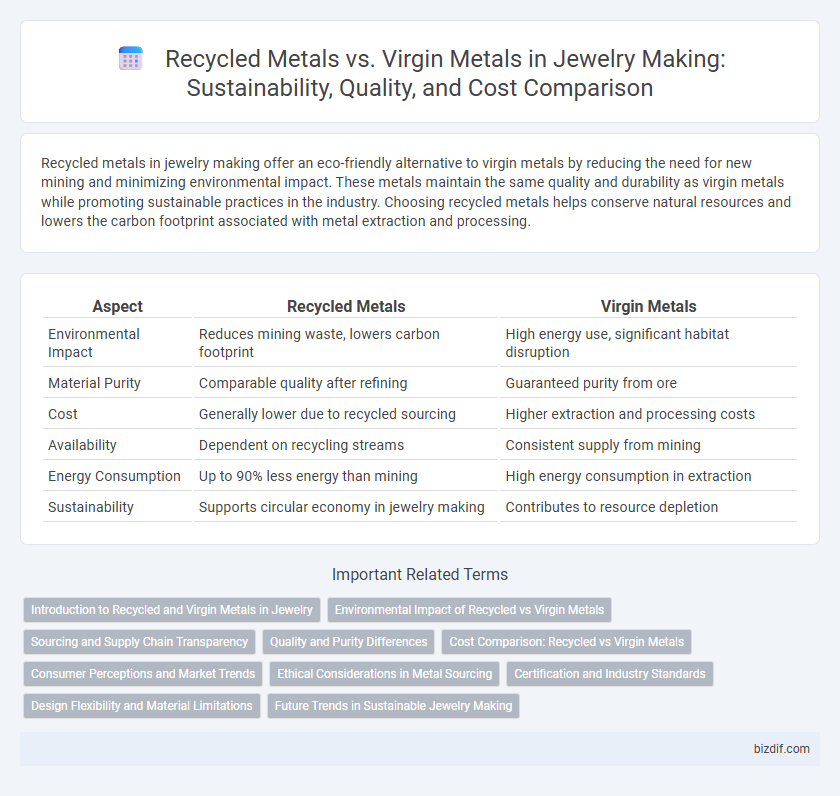Recycled metals in jewelry making offer an eco-friendly alternative to virgin metals by reducing the need for new mining and minimizing environmental impact. These metals maintain the same quality and durability as virgin metals while promoting sustainable practices in the industry. Choosing recycled metals helps conserve natural resources and lowers the carbon footprint associated with metal extraction and processing.
Table of Comparison
| Aspect | Recycled Metals | Virgin Metals |
|---|---|---|
| Environmental Impact | Reduces mining waste, lowers carbon footprint | High energy use, significant habitat disruption |
| Material Purity | Comparable quality after refining | Guaranteed purity from ore |
| Cost | Generally lower due to recycled sourcing | Higher extraction and processing costs |
| Availability | Dependent on recycling streams | Consistent supply from mining |
| Energy Consumption | Up to 90% less energy than mining | High energy consumption in extraction |
| Sustainability | Supports circular economy in jewelry making | Contributes to resource depletion |
Introduction to Recycled and Virgin Metals in Jewelry
Recycled metals in jewelry making are sourced from previously used materials, minimizing environmental impact through reduced mining and energy consumption. Virgin metals, extracted directly from ores, offer high purity but contribute significantly to ecological degradation and resource depletion. Choosing recycled metals supports sustainable practices while maintaining the quality and durability essential for fine jewelry craftsmanship.
Environmental Impact of Recycled vs Virgin Metals
Recycled metals in jewelry making significantly reduce environmental impact by minimizing mining activities, conserving natural resources, and lowering energy consumption compared to virgin metals. Mining virgin metals generates extensive habitat destruction, water pollution, and greenhouse gas emissions, whereas recycled metals reuse existing materials, cutting carbon footprints by up to 85%. Utilizing recycled metals also decreases landfill waste and supports sustainable industry practices crucial for eco-friendly jewelry production.
Sourcing and Supply Chain Transparency
Recycled metals in jewelry making are sourced from pre-existing metal products, reducing the demand for newly mined materials and minimizing environmental impact. Virgin metals often involve complex supply chains with less transparency, increasing risks of unethical sourcing practices such as conflict mining. Transparent sourcing and traceability in recycled metals enhance supply chain accountability, promoting sustainable and ethical jewelry production.
Quality and Purity Differences
Recycled metals in jewelry making often match the quality and purity of virgin metals, as advanced refining processes remove impurities effectively. Virgin metals typically guarantee consistency due to controlled mining and processing, but recycled metals provide comparable durability and luster when certified. Quality assays and hallmarking ensure recycled metals meet industry standards, making them a reliable choice without compromising on purity or performance.
Cost Comparison: Recycled vs Virgin Metals
Recycled metals typically offer a lower cost compared to virgin metals due to reduced mining and processing expenses, making them a more budget-friendly option for jewelry makers. Virgin metals require high energy consumption and extensive extraction processes, which increase their market prices. Choosing recycled metals not only cuts material costs but also supports sustainable practices in the jewelry industry.
Consumer Perceptions and Market Trends
Consumer perceptions increasingly favor recycled metals in jewelry making due to growing environmental awareness and ethical concerns. Market trends indicate a rising demand for sustainable materials, with recycled gold and silver gaining popularity for their reduced ecological impact compared to virgin metals. Brands leveraging recycled metals often experience enhanced brand loyalty and attract eco-conscious buyers seeking responsible luxury.
Ethical Considerations in Metal Sourcing
Recycled metals significantly reduce the environmental impact and energy consumption compared to virgin metals, making them a more ethical choice for jewelry making. The sourcing of virgin metals often involves mining practices that contribute to deforestation, habitat destruction, and human rights violations. Utilizing recycled metals supports sustainable resource management and promotes social responsibility within the jewelry industry.
Certification and Industry Standards
Recycled metals in jewelry making often carry certifications such as Fairmined, Fairtrade, and RJC (Responsible Jewellery Council) that ensure ethical sourcing, environmental responsibility, and social accountability. Virgin metals typically adhere to industry standards like LBMA (London Bullion Market Association) for purity but may lack traceable sustainability certifications. Choosing recycled metals with recognized certifications supports eco-friendly practices and promotes transparency within the jewelry supply chain.
Design Flexibility and Material Limitations
Recycled metals offer enhanced design flexibility by allowing jewelers to work with materials that retain high purity and consistent quality, enabling intricate detailing and innovative shapes. Virgin metals, while traditionally preferred for their predictability in composition, may present stricter limitations due to environmental sourcing and processing constraints. The use of recycled metals supports sustainable craftsmanship without compromising structural integrity, expanding creative potential in jewelry design.
Future Trends in Sustainable Jewelry Making
Future trends in sustainable jewelry making emphasize the increasing use of recycled metals, which significantly reduce environmental impact by lowering mining waste and energy consumption compared to virgin metals. Innovations in metal refining and circular economy practices enhance the quality and availability of recycled gold, silver, and platinum, promoting a shift toward eco-friendly materials. Consumer demand drives brands to adopt transparent sourcing and certification systems, accelerating industrywide commitment to responsible metal usage and reducing carbon footprints in jewelry production.
Recycled Metals vs Virgin Metals Infographic

 bizdif.com
bizdif.com